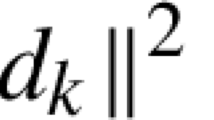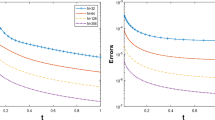Abstract
This study deals with the identification of unknown parameters in an important class of continuous models of aggressive–invasive cancers. This model is obtained as a system of non-linear reaction–diffusion equations from the evolution of cancer cells based on population dynamics. The proposed identification problem is formulated as an optimal control problem with PDEs’ constraint in which an objective functional is defined with respect to the patient and experimental data and an adjoint problem is derived to develop an iterative procedure. A gradient-based iteration method is established to solve this optimal control problem. In each iteration, two systems of nonlinear initial and boundary-value problems (namely, direct and adjoint problems) should be solved. To this end, a nonstandard finite-difference approach is proposed. The robustness of the numerical approach is examined by a test problem without and with noisy data. The numerical results are in good agreement with the results in the literature.
Similar content being viewed by others
References
Casciari, J.J., Sotirchos, S.V., Sutherland, R.M.: Variations in tumor cell growth rates and metabolism with oxygen concentration, glucose concentration, and extracellular pH. J. Cell. Physiol. 15, 386–394 (1992)
Pettet, G., Please, C.P., Tindall, M.J., McElwain, D.: The migration of cells in multicell tumor spheroids. Bull. Math. Biol. 63, 231–257 (2001)
Roose, T., Chapman, S.J., Maini, P.K.: Mathematical models of avascular tumor growth. SIAM Rev. 49, 179–208 (2007)
Mahmood, M.S., Mahmood, S., Dobrota, D.: Formulation and numerical simulations of a continuum model of avascular tumor growth. Math. Biosci. 231, 159–171 (2011)
Mahmood, M.S., Mahmood, S., Dobrota, D.: A numerical algorithm for avascular tumor growth model. Math. Comput. Simul. 80, 1269–1277 (2010)
De Pillis, L.G., Rudonskaya, R.: The dynamics of an optimally controlled tumor model: a case study. Math. Comput. Model. 37(11), 1221–1244 (2003)
Solis, F.J., Delgadillo, S.E.: Evolution of a mathematical model of an aggressive-invasive cancer under chemotherapy. Comput. Math. Appl. 69, 545–558 (2015)
Tosin, A.: Initial/boundary-value problems of tumor growth within a host tissue. J. Math. Biol. 66, 163–202 (2013)
Knopoff, D.A., Fernandez, D.R., Torres, G.A., Turner, C.V.: Adjoint method for a tumor growth PDE-constrained optimization problem. Comput. Math. Appl. 66, 1104–1119 (2013)
Gatenby, R.A., Gawlinski, E.T.: A reaction–diffusion model of cancer invasion. Cancer Res. 56, 5745–5753 (1996)
Gatenby, R.A., Gawlinski, E.T., Gmitro, A.F., Kaylor, B., Gillies, R.J.: Acid-mediated tumor invasion: a multidisciplinary study. Cancer Res. 66, 5216–5223 (2006)
Martin, N.K., Gaffney, E.A., Gatenby, R.A., Maini, P.K.: Tumourstromal interactions in acidmediated invasion: a mathematical model. J. Theor. Biol. 267, 461470 (2010)
McGillen, J.B., Gaffney, E.A., Martin, N.K., Maini, P.K.: A general reactiondiffusion model of acidity in cancer invasion. J. Math. Biol. 68, 1199–224 (2014)
Conde, I.R., Chaplain, M.A.J., Anderson, A.R.A.: Mathematical modelling of cancer cell invasion of tissue. Math. Comput. Model. 47, 533–545 (2008)
Kirsch, A.: An Introduction to the Mathematical Theory of Inverse Problems. Springer Science, Berlin (2011)
Lions, J.L.: Optimal Control of Systems Governed by Partial Differential Equations. Springer, Berlin (1971)
Borggaard, J., Burns, J.: A PDE sensitivity equation method for optimal aerodynamic design. J. Comput. Phys. 136, 366–389 (1997)
Schattler, H., Ledzewicz, U.: Optimal Control for Mathematical Models of Cancer Therapies. Interdisciplinary Applied Mathematics. Springer Science, Berlin (2015)
Hinze, M., Pinnau, R., Ulbrich, M., Ulbrich, S.: Optimization with PDE Constraints. Springer Science, Berlin (2009)
Engl, H.W., Hanke, M., Neubauer, A.: Regularization of Inverse Problems. Kluwer Academic Pub, Norwell (1996)
Mickens, R.E.: Nonstandard Finite Difference Models of Differential Equations. World Scientific, Singapore (1994)
Mickens, R.E.: Advances in the Applications of Nonstandard Finite Diffference Schemes. World Scientific, Singapore (2005)
Acknowledgements
We would like to express our great appreciation to the respected reviewers for their critical and useful comments that improved this paper substantially.
Author information
Authors and Affiliations
Corresponding author
Additional information
Publisher's Note
Springer Nature remains neutral with regard to jurisdictional claims in published maps and institutional affiliations.
Rights and permissions
About this article
Cite this article
Garshasbi, M., Abdolmanafi, M. Identification of Some Unknown Parameters in an Aggressive–Invasive Cancer Model Using Adjoint Approach. Mediterr. J. Math. 16, 3 (2019). https://doi.org/10.1007/s00009-018-1278-6
Received:
Revised:
Accepted:
Published:
DOI: https://doi.org/10.1007/s00009-018-1278-6




